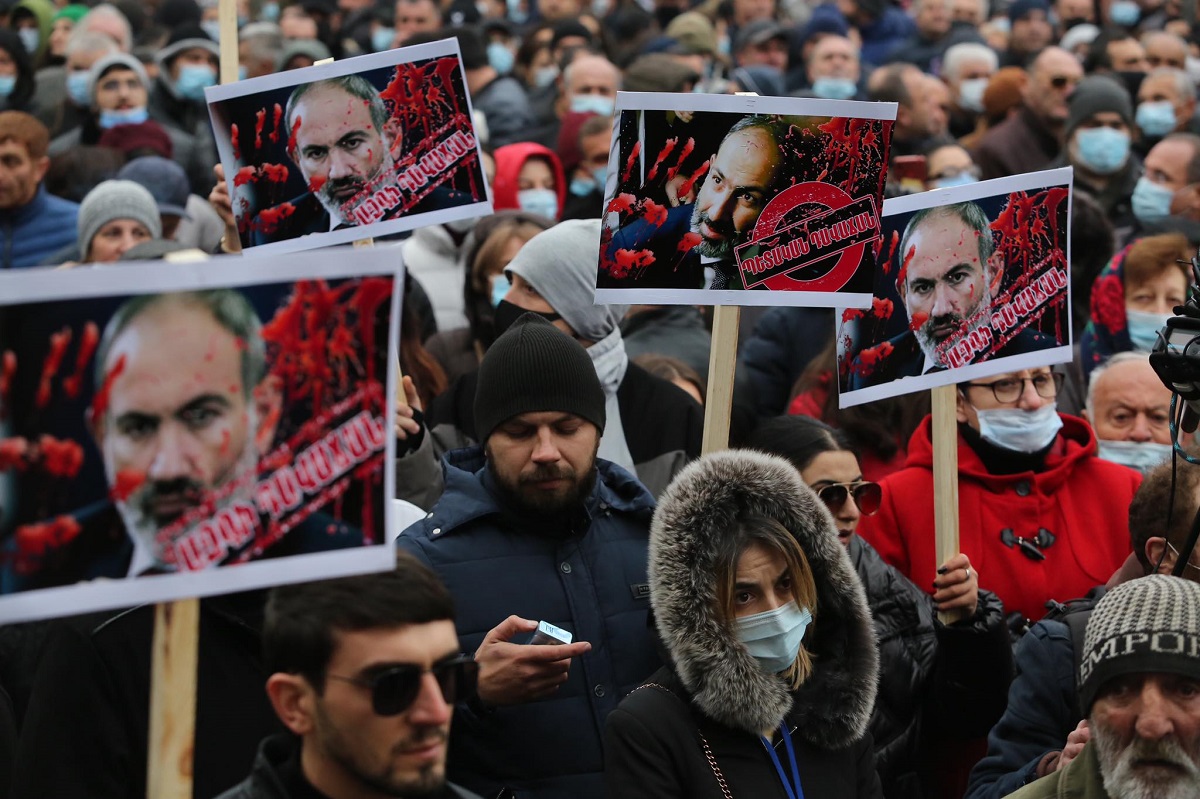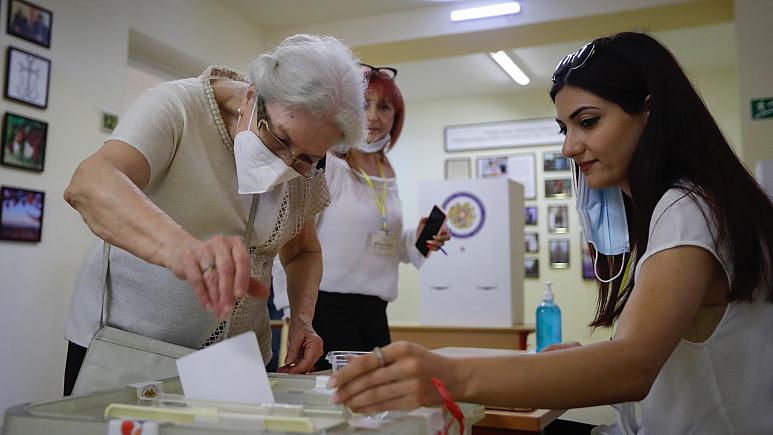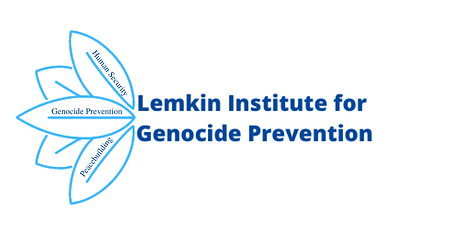One of the latest news from Armenia in the last days of 2022 was the announcement of the creation of a new foreign intelligence service. As reported, at an extraordinary session at the parliament on 20 December, Secretary of the Security Council of the Republic of Armenia Armen Grigoryan presented a government-authored bill on creating a new agency for foreign intelligence. Though it went relatively unnoticed by the political pundits, this late-December move by the Armenian government is arguably an indicator of a number of far-reaching contingencies.
Reforming the foreign intelligence service has been a topic on public-political agenda in Armenia since July 2022. The alleged failures of the intelligence services that are deemed to be one of the reasons for Armenia’s defeats in the ‘4-Day War’ in 2016 and the ‘44-Day War’ in 2020 (the Second Karabakh War) have been the main argument of the proponents of this move. As to that, at a cabinet meeting on 12 December, also referring to these two defeats, Armenian Prime Minister Nikol Pashinyan argued for the need to “transform and develop” Armenia’s foreign intelligence capabilities “according to modern conditions and requirements,” which he said has already been mentioned “in the transformation strategy of Armenia until 2050.” Pashinyan backed his argument by underlining that the Government Action Plan 2021-2026 stipulated the establishment of a foreign intelligence service.
The two stipulations of the government-authored bill are arguably the most critical ones with respect to the prospective foreign intelligence agency. First, the new agency will be directly subordinate to the prime minister. The second critical stipulation is ‘demilitarization” of the foreign intelligence service. Currently in Armenia, foreign intelligence is considered a military service. The new foreign intelligence agency, on the contrary, will be a civilian organ. Armenian officials argue that this will create “broader opportunities for attracting specialists” to form “an intelligence community.” By cooperating with “‘facilitators’ both on a contractual basis and without a contract”, a network of agents will be sought to be established. Besides these, with the creation of a new agency there will be at least three intelligence agencies subordinate to the Ministry of Defense, National Security Service and the Prime Minister.
Subordination of the new foreign intelligence agency to the prime minister means Pashinyan’s control of a critical state organ. As such, this is a move that is in line with his policy of directly supervising all the critical institutions. Apparently, this has much to do with the ongoing power struggle between Pashinyan and the anti-Pashinyan blocs in Armenia, something that the anti-Pashinya bloc is aware of. Consequently, lawmakers that oppose the bill sustain that the government failed to justify why the new agency is supposed to be directly reporting to the prime minister. Tigran Abrahamian’s (a MP from the opposition Republican Party of Armenia and With Honor) claim that the reason for the creation of a new foreign intelligence service is Pashinyan’s distrust to the National Security Service of the Republic of Armenia is noteworthy in this regard. As to the inner fighting within the Armenian state apparatus and the political sphere, it should be recalled that since the Second Karabakh War in 2020 a number of high-ranking civilian and military officials including former Minister of Defense have been either sacked or imprisoned on various charges. Given this state of affairs, a critical question is whether harmony and cooperation between the agencies under the Ministry of Defense, National Security Service and the Prime Minister will be established or these three agencies will turn into instruments of competing political forces in Armenia, which, contrary to expectations, would further incapacitate the Armenian state.
As to the ‘inner fighting,’ one should also be cognizant of the enmity between the official Yerevan and the Armenian diaspora, which is likely to cause other problems, as well. As mentioned above, one of Yerevan’s goals is to enlarge its network of agents abroad. Obviously, Armenian diaspora communities in different countries will be a huge asset for this end. However, disparities between Yerevan and the most well-established diaspora organizations are likely to be a significant challenge to attain this result. The fiery opposition of Gegham Manukyan, a lawmaker from the Armenian Revolutionary Federation –the most established, influential and fanatical traditional diaspora organization - who stated that “Armenia does not have the potential to create an intelligence service from scratch” due to its small population and this move “will only weaken the existing structures within the NSS and the Defense Ministry” indicates the upcoming difficulties on Armenia-Diaspora nexus. Given this crack and Pashinyan’s ongoing attempts to redesign the Armenian diaspora, the new bill may also be pointing out to the beginning of a process of forming Yerevan (and to this effect, Pashinyan) friendly diaspora organizations, which may result in weakening of the cohesion among the diaspora communities.
Besides power struggles in Armenia and between the official Yerevan and the Diaspora, broader implications of the move to establish a new foreign intelligence agency should also be underlined. Firstly, the formation of a new agency could be viewed as a part of Yerevan’s objective to reform the ineffective state apparatus, an objective that has been robustly voiced since Fall 2020. Given that the intelligence service is a major component of the state’s security establishment, its modernization could be deemed a move in the right direction. Secondly, it should not be overlooked that the reform in the intelligence sector is likely to be directly connected with Pashinyan’s intention to recast Armenia’s foreign policy. Put differently, the creation of a new foreign intelligence agency in Armenia could be related to a tendency to reorient Armenia’s foreign policy. In fact, several indicators point to this likelihood.
On 15 July 2022, the director of the US foreign intelligence service (CIA) William Burns met Pashinyan in Yerevan. During his visit, Burns also met the Secretary of Armenia’s Security Council Armen Grigorian. No details of the meetings were given besides the short statement of the Armenian government that the two discussed “international and regional security,” “processes taking place in the South Caucasus” and “the fight against terrorism.” It was also reported that Burns and Grigorian discussed regional security and Armenia’s normalization with Azerbaijan and Türkiye.
As the first ever visit of a CIA Chief to Armenia, Burns’ visit to Yerevan was a very significant event. Besides this significance, what was also noteworthy about the visit was that it was revealed by the Russian state-owned news agency and radio broadcast service Sputnik, whereas Armenian and American officials abstained from highlighting the meeting in Yerevan. The visit of the head of Russia's foreign intelligence service (SVR) Sergei Naryshkin to Yerevan to hold talks with Pashinyan just three days after Burns’ visit, on 18 July, was also very eye catching. As to these visits, the Radio Free Europe’s Armenian desk Azatutyun quoted Tigran Grigorian, an independent political analyst, claiming that “U.S. and Russian security officials arrived in Armenia in recent days for confidential talks focusing on the war in Ukraine.” Like T. Grigorian many observers relate the traffic in Yerevan to the ongoing Russia-Ukraine war.
Two and a half months after Burns’ visit, on 30 September, A. Grigoryan (Secretary of the Security Council of Armenia) visited the headquarters of the CIA in Virginia. No details about this visit was shared with the press. Following that, in December, meetings of the same sort were again reported, though this time the head of the British foreign intelligence service (MI6) Richard Moore replaced his CIA counterpart Burns. On 12 December 12, A. Grigoryan met Moore and the UK Parliamentary Under Secretary of State at the Foreign, Commonwealth and Development Office Leo Docherty in London. Four days after this meeting in London, on 16 Decemberh, Moore arrived in Yerevan to meet Pashinyan in person. Nothing much other than the very generic ‘discussion of regional security’ was stated as the purpose of these meetings. Interestingly enough, between these four days, on 14 December, the former commander of the Second Army Corps and the former head of the intelligence department of the Armenian General Staff, Major General Arayik Harutyunyan was arrested due to charges of negligence. It should be noted that this arrest was not an isolated case. Rather, it was the latest example of the series of arrests of the high-ranking Armenian security officials since Fall 2022.
The chain of events that have reverberated in media reports at least since July 2022, that is, Armenian officials’ meetings with American and British intelligence chiefs, Russians’ reactions, and the arrests of the Armenian security officials, indicate that the US and the UK have a hand in the plan of establishing a new foreign intelligence agency in Armenia. We do not know whether there were other secret meetings, though this is not an ignorable probability. Regardless, it is presumable that the decision for the establishment of the foreign intelligence agency in Armenia has been consulted, if not coordinated, with American and British intelligence and security establishments. This likelihood points out not a simple technical assistance of the West to a former Soviet republic. Rather, the creation of a new foreign intelligence agency looks like an attempt to remold Armenia's web of international relations or at least a move in this direction. If this is the case, we could expect some quite interesting developments in the South Caucasus in the near future.
*Photograph: Armenpress
© 2009-2025 Center for Eurasian Studies (AVİM) All Rights Reserved

 DEVELOPMENTS IN POST-2020 KARABAKH WAR ARMENIA AND THEIR IMPLICATIONS - III: PRESIDENT A. SARKISSIAN: A WISE MAN OR AN OPPORTUNIST?
DEVELOPMENTS IN POST-2020 KARABAKH WAR ARMENIA AND THEIR IMPLICATIONS - III: PRESIDENT A. SARKISSIAN: A WISE MAN OR AN OPPORTUNIST?
 DEVELOPMENTS IN POST-2020 KARABAKH WAR ARMENIA AND THEIR IMPLICATIONS – 1: THE RIVALRY BETWEEN THE OPPOSITION AND PASHINYAN
DEVELOPMENTS IN POST-2020 KARABAKH WAR ARMENIA AND THEIR IMPLICATIONS – 1: THE RIVALRY BETWEEN THE OPPOSITION AND PASHINYAN
 FORGETFULNESS OF POPE FRANCIS AND PRESIDENT GAUCK: ACCIDENTAL OR WILLFUL?
FORGETFULNESS OF POPE FRANCIS AND PRESIDENT GAUCK: ACCIDENTAL OR WILLFUL?
 “YET ANOTHER DECISION AGAINST ARMENIA ON NAGORNO-KARABAKH” – COMMENTARY PUBLISHED IN HURRIYET DAILY
“YET ANOTHER DECISION AGAINST ARMENIA ON NAGORNO-KARABAKH” – COMMENTARY PUBLISHED IN HURRIYET DAILY
 THE 20 JUNE 2021 SNAP PARLIAMENTARY ELECTIONS IN ARMENIA - I: THE SOCIO-POLITICAL LANDSCAPE IN ARMENIA
THE 20 JUNE 2021 SNAP PARLIAMENTARY ELECTIONS IN ARMENIA - I: THE SOCIO-POLITICAL LANDSCAPE IN ARMENIA
 DISPLAY OF BIGOTRY AND BIAS FROM THE LEMKIN INSTITUTE
DISPLAY OF BIGOTRY AND BIAS FROM THE LEMKIN INSTITUTE
 THE ASSASINATION OF TALAT PASHA
THE ASSASINATION OF TALAT PASHA




























